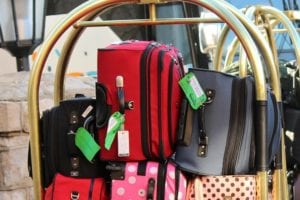Should you lock checked luggage when you fly? If you do, should you use a TSA approved lock or some other method like seals or zip ties?

When we arrived at our home airport we noticed that the bag was damaged. Its zipper was partially torn open. But the lock was in perfect shape, still locked.
We opened the bag. There was a note from TSA saying that they hand inspected the bag. There was nothing missing. The airline told us that since TSA opened the bag, they wouldn’t accept liability for the damage. Our claim to TSA was denied. That’s not surprising, as in a study by Stratos they found that 54 percent of TSA claims for baggage and its contents were denied. We sent the bag to the manufacturer to have the zipper replaced at our expense.
About a year later, on a flight to Chicago, my checked bag was damaged by TSA again. There was a note in bag that said my TSA approved lock failed and they had to cut it off. While they cut it, they cut a hole in the bag. TSA partially approved my claim. They only gave me enough to get my bag repaired, not replaced. I replaced the bag.
From the time air travelers release custody of their checked bags there are opportunities for damage or theft. Bags are checked at their starting airport, and until they retrieve their bags at their destination airport there are chances to lose its contents or have them damaged. The airport, airline and TSA personnel can steal the bag and/or its contents.
Why should you lock checked luggage?
Locked checked luggage makes it at least somewhat difficult for airport, TSA and airline personnel to steal the belongings. In addition, the locks will keep the zipper together or prevent latch locks, if any, from flipping open. This stops the bag’s contents from falling out to be damaged, at best, or lost.
Do luggage locks actually protect your belongings?

Virtually any luggage that uses a zipper closure method can be penetrated with a pen or screwdriver, even with the locks fully intact and in place. As to latched luggage, most every commercially sold latched bag can be easily opened by either picking the lock or using a couple of tools to break the latch. A thief doesn’t care if opening it damages your luggage.
Should you secure your checked luggage for air travel?
In a word, yes, but since the incidents I described above, my wife and I haven’t used a lock on our luggage for air travel. We’ve used another way to secure our checked bags. It’s worked every time to secure them from accidental opening due to mishandling or damage, plus it’s prevented the luggage from getting damaged by TSA again.
We now use numbered, single use, “safety control seals” to secure our checked luggage. Our luggage is still zippered and the seals are used to hold the two pulls together. Once the seals are locked, they can’t be unlocked. They can only be broken or cut, which is easy to do with shears or scissors. Luggage can even be pulled apart with a hard yank by almost any adult. They are meant to stop an accidental opening of the luggage and TSA from damaging the luggage when opening it for an inspection. They aren’t meant to stop a dedicated thief, as that’s not really possible to accomplish. We also use a colorful, heavy-duty, non-slip baggage belt on our luggage, primarily to help identify our bags, but also to prevent the bags from accidentally opening if damaged or if they suffer zipper failure.
Numbered seals or zip ties? Both work.
I use the numbered luggage seals for their psychological advantage over ordinary zip ties, but zip ties will work, too. The numbered seals make them look official, like the identical seals used by electric companies on home meters as tell-tails to indicate tampering, or on sealed boxes, cabinets and carts.
Since the incidents, TSA has hand inspected my bag once, as far as I know. That time there was no damage to the bag. The luggage seal was missing when I retrieved the bag. That infers that TSA cut it or pulled it apart rather than again punching through my zipper. Moreover, since we started using the luggage seals, we haven’t had any missing belongings in our checked bags during air travel. You may say that it is lucky, but most personnel at TSA and those handling luggage at airports are honest.
How else should you protect the belongings you wish to pack in your checked luggage?
While traveling by air, the first line of defense against theft of your belongings from your checked luggage is to deny thieves the opportunity. Never pack cash, jewelry, electronics, photographic equipment, securities or negotiable papers, or any other valuables or breakables and any item you consider irreplaceable in your checked bags. Always leave every valuable or breakable you don’t need on your trip at home. Never pack any travel documents or personal identification in your checked luggage.
If it’s not in your bags, it can’t be stolen from them.
Once I retrieve my checked luggage at my destination airport, I put a lock on it if I’m taking some form of public transportation from the airport to my next stop, particularly a bus or train which requires me to check the bag again. I do that despite the small actual impact of the lock to prevent a dedicated thief. I believe that it creates an extra layer of theft deterrent due to its psychological effect. Once out of the destination airport, TSA damaging my lock is no longer a problem.

Checked luggage for air travel should be locked or “sealed” to prevent accidental openings of luggage zippers or latches and to put an impediment in the way of thieves who, seeing that the bag is locked or sealed, will hopefully skip the bag and move on to an easier theft. The real question isn’t whether or not your checked luggage should be locked; the question is should you use an actual lock, TSA approved, of course, or some other locking mechanism. In my opinion, the better choice is to use a seal or zip tie.
After many years working in corporate America as a chemical engineer, executive and eventually CFO of a multinational manufacturer, Ned founded a tech consulting company and later restarted NSL Photography, his photography business. Before entering the corporate world, Ned worked as a Public Health Engineer for the Philadelphia Department of Public Health. As a well known corporate, travel and wildlife photographer, Ned travels the world writing about travel and photography, as well as running photography workshops, seminars and photowalks. Visit Ned’s Photography Blog and Galleries.



